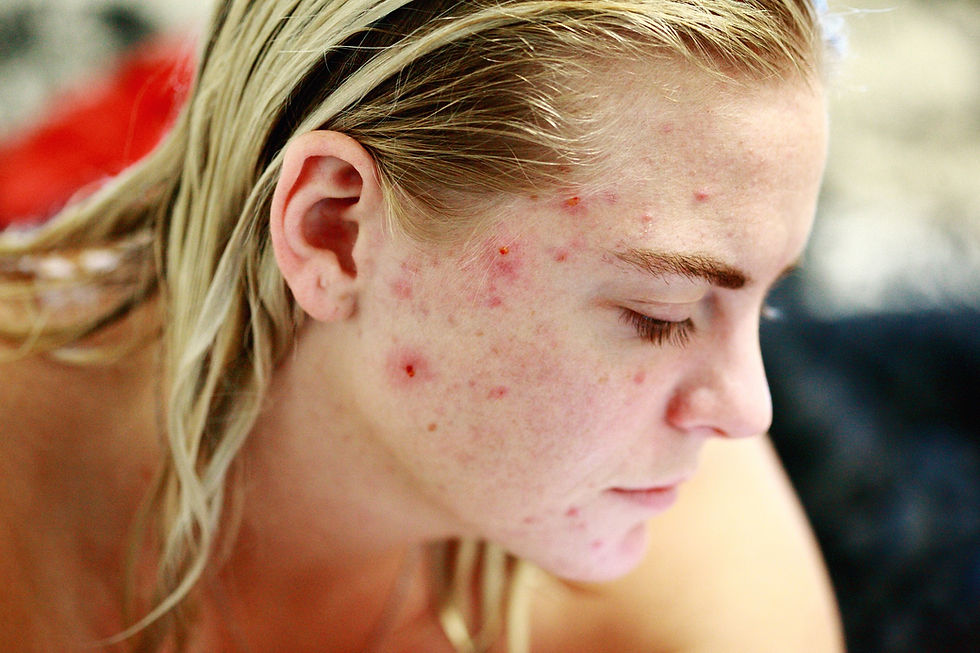How To Cure Acne With Diet
- The Young Vegan
- Aug 30, 2019
- 3 min read
Updated: Mar 15, 2021
Acne is something that is seen as a rite of passage, that it’s something that happens to everyone, all teenagers anyway, but this isn’t true. The American Academy of Dermatology claims that 85% of Americans between the age of 12 and 24 get acne, while the British Skin Foundation says that acne is simply common.
What Is Acne?
Acne happens when the sebaceous (oil-producing) glands make too much oil. At the same time, the dead skin cells lining the pores are not shed properly and clog up the follicles. These two things cause a build-up of oil leading to spots. The real problem, though, is caused by a bacteria that lives on our skin, acne bacterium that loves the environment inside of the spots. This triggers the formation of red or pus-filled spots.
What is It Like To Live With Acne?
Acne and other skin problems, especially those that affect people's faces, make people feel miserable. When the problem is bad, with large spots that rupture and bleed people will do anything that they can to avoid people seeing them. Boys and girls grow their hair long and use it to cover their face, they'll wear hoodies and hats and, on bad days, they won't go out at all. Teasing and bullying can leave people depressed and then there's the pain. It's awful. But, there are things that you can try to help, if not cure, your acne.
How Can You Treat Acne?
The NHS advises seeing your GP if you have acne and recommends various medications that can help. But what if you don’t want to take tablets or uses creams that really aren’t good for you?

Simple treatments are to keep you skin clean and moisturised, avoid touching your face and regularly wash anything that touches your skin such as pillowcases or hats. Eliminating things from your diet that will aggravate your skin will stop your skin from getting inflamed, this could be a food, perfume, skin product or even washing detergents or conditioners. The next thing is to include high levels of foods that build and heal skin that and lead to healthy, clear, glowing skin.
Foods That Harm, Foods that Heal
Eating a lot of saturated fat can increase sebum production on the surface of your skin, clogging your pores and causing acne. Animals fats and refined oils, like olive oil, have been linked to poor blood flow in the skin which causes the skin to be more likely to develop acne, so avoiding these things is a must. Not eating enough plant antioxidants can also cause damage to your skin as the oxidation of chemicals within the body causes damage to cells. Skin cells, especially, can suffer a great deal as radiation from the sun and pollution in the air causes oxidation as well. This means that these cells are always under attack.
It has been found in recent years that there is a connection between dairy products and skin problems, from acne to eczema. A 2017 study, "Acne and dairy products in adolescence" found that the more milk people drank the more people had acne and the worse it was. It wasn't just that drinking more milk and eating things like yogurt and cheese makes acne worse, it can actually cause it.

Some people will claim that eating chocolate and other junk foods make acne worse, but the truth is that a poor diet leads to poor health and, in turn, poor skin. If you're not eating fruits and particularly vegetables your body will not be getting all of the goodness that it needs to keep itself strong and healthy. Also, if you are eating a lot of fat some of that is going to affect your skin causing it to look dull, patchy and even old. Avoiding dairy, which contains saturated fat and cholesterol will allow your skin to heal from the inside out, something that face washes and lotions can't do.
If you have acne, or you know someone that does try removing all of the dairy, milk, cheese, yogurt and increase the vegetables. If you have 3 portions a day try four or even five and see if your skin problems improve. Let me know in the comments how you get on.

Comments